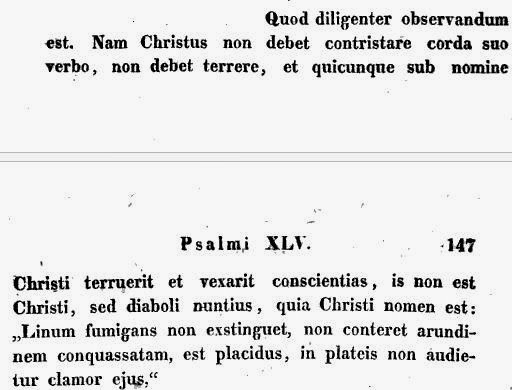In the comments, Bryan Cross has staked his life (seemingly) on the concept that the Protestant argument for the development of the canon of the New Testament is merely an “ad hoc” argument; we can’t know the canon infallibly, whereas, Rome has defined the canon “infallibly”.
I haven’t done a thorough study of this, but according to Wikipedia, the word “infallibility” wasn’t even a concept in the church until the 9th century, applied to the papacy by the megalomaniac Gregory VII (“the Roman church has never erred; nor will it err”) in the Dictus Papae. No doubt he said this with a straight face. [And we’ve certainly seen Bryan Cross’s straight face in his gravatar.]
So what genuinely seems “ad hoc” is the thought that this concept of infallibility was superimposed on the canon development process. There is no historical warrant for it.
I would suggest to you that a better principle in terms of this issue particularly is, "what did they know, and when did they know it?" That, after all, is the essence of what the study of history is all about.
In other places, I've traced some of the theological reasons for the development of the canon. The early church, once beholden to the preference for "oral tradition" (as Cullmann described, citing Papias in the early 2nd century), faced with questions such as those produced by Marcion, came to the conclusion that it needed its own "canon" -- the heretical ideas of those early Gnostic years were just becoming too pervasive; the development of the authoritative bishop, the notion of "succession" as a kind of proof of authority, and also a fixed canon all came into focus during those years.
Especially with regard to the fixing of the canon, I'd commend to you the works of David Trobisch. In his work Paul's Letter Collection (Minneapolis, MN: Fortress Press, 1994), he studies manuscript evidence as well as the our understanding of the simple development of "the codex" as a form of communication. He makes the case that Paul himself began collecting his own letters into a collection. This is confirmed by Stanley Porter in his contribution to Exploring the Origins of the Bible, Craig A. Evans and Emanuel Tov, Editors (Grand Rapids: Baker Academic, 2008).
Andreas Kostenberger and Michael Kruger place the New Testament documents into the concept of "covenant documents." The earliest church was thinking in terms not only of "new covenant" ("new testament") but also "covenant documents." Kostenberger and Kruger trace this process through their The Heresy of Orthodoxy (Wheaton, IL: Crossway Books, 2010). One of the more striking images was that of the "beehive of activity" involved with the process of creating and distributing books and codexes of the Scriptures during the first half of the first century.
As Steve Hays noted, the Pentateuch was what it was, because of who Moses was. He did not require some sort of imprimatur to come along at a later date and certify those five works as Scripture. Moses's works were "covenant documents"; they were Scripture at the moment he wrote them. And Kostenberger and Kruger argue that the New Testament documents were also viewed as covenant documents, created and ratified by the Apostles, again, the unique eyewitnesses to Christ himself, the total revelation of God (Hebrews 1), and treated in a similar way.
Finally, Trobisch (again) traces both the need for and the development of "the canonical edition" or The First Edition of the New Testament, (Oxford: Oxford Unity Press 2000).
Trobisch notes this about "the Canonical Edition":
The atmosphere created by the conflict with the Marcionite movement and the Easter Controversy contains characteristic features of the implied readership of the Canonical Edition. The edition portrays Paul and the Jerusalem authorities in a harmonious unity, presuming that the readers are conscious of the worldwide unity of the church. The success of this publication did not depend on an authoritative decision of the church; rather, readers found their convictions better expressed in the Canonical Edition than in competing literary works. During hard times of persecution, this book was capable of defining or reinforcing the identity and the unity of its readers. At the end of the second century and in the beginning of the third, Irenaeus was reading this edition in Lyons; Tertullian read it in Carthage and Asia Minor; Clement had it in Alexandria, and Origen in Palestine. This particular edition, in other words, was read worldwide.In the New Testament Scriptures were found the unity and truth of the early church. In truth, none of this is "ad hoc". It is a historical process, unfolded by the Providence of God, and New Testament scholars like Cullmann and Ridderbos and Trobisch and Andreas Kostenberger and Michael Kruger are investigating the sources in a detailed manner, and the history of this process is coming more sharply into focus.
Really, it's the quest for "infallibility" that is an ad hoc concept, superimposed on the process, many centuries after the process occurred, and at best "infallibility" (as an ad hoc idea) was superimposed at Trent, when Rome really had no other response to the Reformation but to try to assert its own authority with a made-up, ad-hoc concept (infallibility).
For more, extremely thorough documentation of how the New Testament came together, see also this complete treatment by Jason Engwer at Triablogue.













